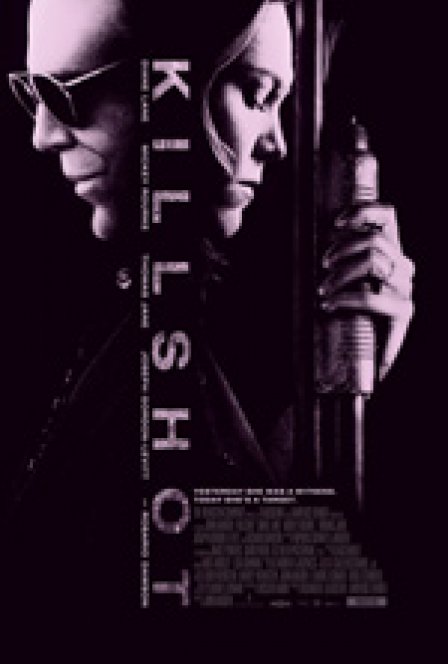Killshot, the latest failure by the Weinstein Company, is a real mystery, with many layers designed to be difficult for viewers to unravel. But the only thing that isn't confusing is why the Weinstein Company pushed Killshot back so many times over the course of three years (the film was shot in 2005) before condemning it to what is essentially a straight-to-DVD release. And perhaps even that is more than it deserves.
The film is helmed by Oscar-nominated director John Madden and based on a beloved novel by mystery master Elmore Leonard, who is also credited as a producer. If that isn’t enough talent to pique your interest, the film stacked its cast with the resurgent Mickey Rourke, as well as Diane Lane, Thomas Jane, Joseph Gordon-Levitt, and Rosario Dawson. Somehow, all of these talented actors give stilted and halting performances.
Killshot opens with a long montage. Blackbird's (Rourke) narration educates us on execution methods. The sequence is set to “Monkey” by Low. And this is only a prelude to the weirdness to come in the film's next, misguided, hour and a half. The sequence ends with Blackbird accidentally shooting his younger brother during a heist. With little sense of irony, the film attempts to use this section both as proof that Blackbird is a ruthless assassin and to garner sympathy for the loss he can't let go of.
Killshot goes on to follow Blackbird as he runs from his former employers in the Toronto mafia, where a hit has gone wrong. He meets Richie Nix (Gordon-Levitt), a young criminal who provides a nice antithesis to the quiet, plodding and experienced Blackbird. Richie has a plan to blackmail a real estate mogul, but it goes terribly awry when he mistakes the construction-worker, Wayne (Jane), for the man being blackmailed. Wayne’s wife Carmen (Lane) sees the whole thing happen, and as Richie and Blackbird prepare to flee, Carmen sees Blackbird’s face.
As ridiculous as the film has been up until now, this is where it really starts to fall apart. Blackbird’s odd "code of honor" requires that he kill Carmen, because she saw his face. (That he doesn’t really ever try to hide his face during any robberies or hits seems to be besides the point.) His need to kill Carmen gets the mob and FBI on his trail and forces him to reveal his face to many people along the way, none of which seem to activate to his rather finicky code of honor. Meanwhile, Richie decides that, despite the absence of reward money, he will follow Blackbird and continue to hunt down Carmen and Wayne, for no apparent reason.
And this is where the mystery begins. How did no one along the way raise their hand during production and say, "Uh, Mr. Madden? This doesn’t make sense anymore. Bird’s code of honor is a thin MacGuffin for a man to hunt down someone he doesn’t know. And Richie, who is a self-centered character driven by money, has little reason to join forces with a man he doesn’t even know, for no reward, when he could just run away. And what happened to the mob? That whole sub-plot just disappears after an hour."
So, yes, this film is complicated. The plot is so mindless and banal that it almost manages to fake complexity. "There is no way this film is making so little sense," we might say to ourselves. "I must be missing something." Killshot's laborious production deserves a film of its own -- a sort of Lost in LaMancha that ends in a DVD release.

